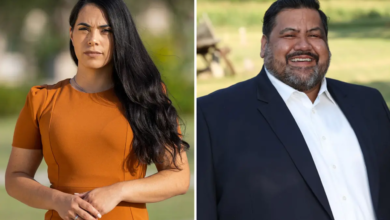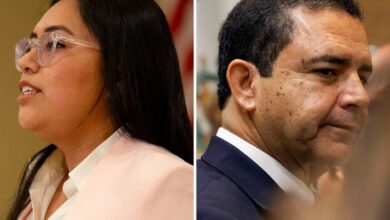Pulse On Policy: Texas 21 Congressional Forum With Video
![]() On Wednesday, May 2, the San Marcos Area Chamber of Commerce partnered with the Austin Chamber Commerce to host and sponsor a forum for the Texas 21 Congressional runoff candidates…
On Wednesday, May 2, the San Marcos Area Chamber of Commerce partnered with the Austin Chamber Commerce to host and sponsor a forum for the Texas 21 Congressional runoff candidates…
![]()
On Wednesday, May 2, the San Marcos Area Chamber of Commerce partnered with the Austin Chamber Commerce to host and sponsor a forum for the Texas 21 Congressional runoff candidates.
The four candidates hope to replace Congressman Lamar Smith. Smith was first elected to Congress in 1986. He announced his retirement from Congress in November 2017.
He currently serves as Chairman of the Science, Space, and Technology Committee and continues to serve on both the Judiciary Committee and the Homeland Security Committee. He is the former Chairman of the Judiciary Committee and the Ethics committee.
Democratic candidates Mary Wilson and Joseph Krosper, as well as Republican Candidates Matt McCall and Chip Roy, attended the event to discuss issues from the recent Tax Reform bill to immigration and education.
The date for the primary runoff election is May 22; Early voting begins Monday, May 14, and ends Friday, May 18.
![]()
- QUESTION 5: Central Texas is not only one of the fastest growing regions of the state but also in the entire country.

If elected what infrastructure solutions would you propose to address the needs of such a rapidly growing area, and such a rapidly growing Congressional district?
![]()
MARY WILSON (D): I mean, the infrastructure in our country hasn’t been funded properly for decades, and so that’s clearly one of the things that we have to do is fund it properly.
And then I think that we have to have a federal government that works with all the local municipalities and agencies as well like over here in Hays County, the commissioner’s support in working with one, flooding issues on the San Marcos River that are just repetitive now. That the whole idea that we have a five hundred year floodplain is kind of laughable when it happens what? three out of the past four years and then that wipes out communities, roads, and infrastructure.
And also damages water supply. So in that one of the fastest, if not the fastest growing county in the country, this question is particularly important. So we need funding from the federal government; we need to have federal government that is working with local governments. Because local governments are the ones that are there on the ground, and know where the problems lie, which roads need to be built, which flood erosion and mitigation need to be done.
And you have to have communication. And one of the ways to do that I think is to eliminate in some ways, some of the paperwork that often goes into these things. And would streamline the process. But the federal government is gonna be a part of this, and the federal government is going to be the one that funds the biggest portion of it; and we have to then have the budget that allows us to do that.
![]()
MATT MCCALL (R): We, surely, can agree that there is a great deal that needs to be done on infrastructure and transportation. And a big part of the problem is that Texas has been a donor state as far as the gas tax goes.
And when I was a kid, Texas had the best roads in the country, and now look at it. I mean it just seems like I-35 I think has been torn up for the last 40 years. They’re always doing something to it, and they’re always behind.
And we’re not using our resources properly. The federal government certainly has a role in that. And the states have a role in it. Currently, the way we’re funding the metropolitan transit districts, it’s very interesting.
I have a friend, city council member, Bernie, and he’s on the area one in San Antonio, and he’s explained that the state gives him a pot of money, and they have 24 people on the board and everybody wants some of that money spent in their own little district.
And so there’s no money to do the big projects. Fix 1604 without a toll on it. And so you had the same problems up here.
And we need to look at the state level of how we’re actually getting that funding done and whether it’s just all being divvied up or whether it’s being spent on real priority big projects.
The federal government needs to give us our money back, and I think we should be a receiving state on the federal gas tax. Because we have the growth.
And we need to bring that money home. San Antonio has a lot of work that we can still do on it’s airport. I fly for business to Europe, and I’m envious that Austin has, that some are three direct flights to Europe. San Antonio doesn’t.
We need more flights to Latin America. We do a lot of business in Latin America. And so yes there’s a lot that we can do, and the federal government does have a role that’s actually a constitutional role.
We have a constitutional role to have postal roads which I think that has metamorphosed into the highway system that we have, the inter-state highway system.
So I want to do that. We need to improve it for business and for our personal lives. But if business can’t get their products to market, then they’re going to leave.
And this district lost AT&T because of airport concerns, and we need to work on these things.
![]()
JOSEPH KOPSER (D): So as I said in the beginning, since I was a kid when I see problems, I fix them. And in the category of transportation and infrastructure, that’s one of my proudest achievements in life as a professional.
Which is the company I built, organized all the available transportation in the community from public transportation to car-share, ride-share, carpool, all the different ways to get around a community, put them into a mobile app.
This app, we are sending today as I said, this is the innovation corridor. In 2014, the U.S. Department of Transportation recognized our efforts as the 2014 Data Innovation Award Winner.
When I say I wanna represent this district, it’s because I have real-world experiences actually solving these problems. Not sitting on the staff, not reading about it, doing the work and actually making it happen.
There are so many opportunities, just like the new logistic center that was opened here Kyle. To take advantage of the growth and it’s potential. But it has to be smart.
And there’s some great examples. As the Austin and San Antonio airports expand for all this growth, we need to look at taking the army airfield here in Hays County and potentially using it for a logistics transportation hub.
We need to figure out how we control and manage growth that will be coming and protect the Edwards Aquifer. We have all kinds of opportunity for growth east of I-35. And then we also have to look at what we do as we grow in this community.
More residential, more affordable housing so that the people that want to work in our counties can stay in our county’s and not have to commute an hour because there are no jobs.
Out in the Hill Country of this district, the middle class is disappearing because there’s not enough well-paying job for them to support a family, forcing them to move to San Antonio and Austin. Further burdening our infrastructure.
There’s a whole range of steps we can take. I’ve been doing those in my life; I’ve been building them in companies both in profit and non-profit and I wanna take that experience to Washington D.C. and represent this district.
![]()
CHIP ROY (R): Looking back, Joseph and I first met on an airplane, Southwest, and I was Senator Cruz’s Chief of Staff flying back and forth, and he’d tell me about his business.
Look I think what we’re looking at here is the reality of Texas being the tenth largest economy in the world. And a state that of course is attracting a great number of people here, and that is growing by leaps and bounds.
And you don’t have to look very far to see where it’s gonna impact us the most; it is right where we’re sitting.
If we look at the corridor between Austin and San Antonio, and you go look at Dallas and Fort Worth, look at what’s growing up between Dallas and Fort Worth then that’s what we’re going to see in New Braunfels and San Marcos and all up and down the I-35 corridor, right?
It doesn’t take a genius to see that that’s where that’s headed. And we’re not ready; we’re not where we need to be.
But I would start with the premise that, what would Texas do as the tenth largest economy in the world. That is bigger than Russia, that is bigger than a great number of industrialized countries in the world if the United States federal government didn’t exist.
Would we just sit back and just wait and just hope somebody would come solve the problem for us or would we get busy about how we solve the problem in Texas and what we want to do?
And that informs my thinking about what we want out of Washington. We want Washington, with it’s $21 trillion of debt, and it’s extension well beyond it’s core constitutional function, bleeding money in all directions to get back focused on it’s core responsibility.
And with respect to transportation, if we can’t get the tax burden down and allow Texas to be doing more of it ourselves, at least block grant those dollars back to the state’s and give Texas more authority to be able to handle our transportation and infrastructure need here locally with people who know what’s in the best interest of the people in the state of Texas.
That is a far better model for us to be able to function, with the complexities that we’ve gotta deal with and how we move people around, particularly the central Texas corridors it’s expanding.
Dealing, by the way with the traffic coming up from Mexico along I-35, it’s gonna continue to grow over the future.
So that’s the starting point. Is getting the dollars back into our ability to control as much as possible here at the state and local level in Texas.
![]()






